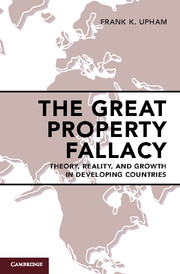Book contents
- Frontmatter
- Dedication
- Contents
- Preface
- Acknowledgments
- 1 Introduction
- 2 Physics Envy: Property Rights in Development Theory
- 3 Property and Markets: England and America
- 4 Property and Politics: Japan
- 5 Law and Development without the Law Part: China
- 6 Theory in Action: Cambodia
- 7 Property Rights and Social Change
- Index
4 - Property and Politics: Japan
Published online by Cambridge University Press: 19 January 2018
- Frontmatter
- Dedication
- Contents
- Preface
- Acknowledgments
- 1 Introduction
- 2 Physics Envy: Property Rights in Development Theory
- 3 Property and Markets: England and America
- 4 Property and Politics: Japan
- 5 Law and Development without the Law Part: China
- 6 Theory in Action: Cambodia
- 7 Property Rights and Social Change
- Index
Summary
In the previous chapter, we saw how the English and American legal systems changed property law to allow powerful landowners to exploit economic opportunities that would otherwise have been prevented by existing property rights. Both events had political effects, but their impetus and motivation were economic. The landowners wanted to introduce new technologies or products to meet emerging market demand in ways that would illegally harm their neighbors. Legal institutions were used to steal from the weak. In this chapter, we shift from an economic to a political perspective as we examine land reform in post-WW II Japan. Here politics dominated from the outset and legal institutions were used to steal from the strong.
Postwar Japan, intentionally or not, chose a politically stable rural population over an efficient agricultural sector. The core principle of the next five decades of agricultural policy was to guarantee ownership of farm land by those who farmed it, first by a comprehensive land reform, later by severely restricting the rural land market to prevent the reemergence of tenancy. On its own terms, the policy was an unequivocal success. Rural Japan became a central pillar of postwar Japanese democracy. Looked at through an economic lens, however, the picture is very different.
The story begins with the legal restructuring of Japanese agriculture in the latter half of the nineteenth century. Already highly commercialized but faced with Western pressure to modernize its legal system, Japan shifted from a nominally feudal land tenure system to a thoroughly capitalist one by the end of the century, a change that was accompanied by increased tenancy and the emergence of a class of absentee landlords. Although the causes and magnitude of the transformation are debated, the conventional wisdom in the immediate postwar period was that rapacious landlords had so exploited their tenants that the xenophobia of the latter became one of the prime causes of Japanese militarism and World War II. It followed that, pressed by the American Occupation, an initially reluctant government passed a thorough land reform that was intended to replace the easily manipulated downtrodden tenants of prewar Japan with a rural cadre of enlightened liberal farmers that would preside over a renewed blooming of Japanese agriculture.
- Type
- Chapter
- Information
- The Great Property FallacyTheory, Reality, and Growth in Developing Countries, pp. 61 - 82Publisher: Cambridge University PressPrint publication year: 2018



